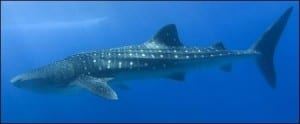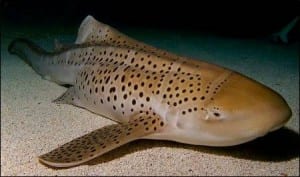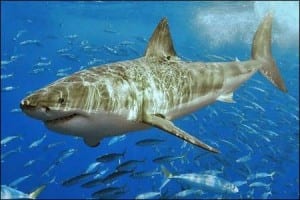Jaws for Thought
By Emma-Louise Nicholls, on 1 August 2012
 Working at the Grant Museum I get asked a lot of questions about animals, most of which I can answer, some of which (normally from 5-6 year olds) I have to look up. A member of the public knows whether they’ve hit an information goldmine, or else should make excuses and leave immediately, when they say the s-word and see my eyes light up. The s-word brings excitement to some (such as myself) and abject horror to others- mostly those who were of a cinema-going age in the 70’s. For yes- the s-word of which I speak is ‘shark’. What hacking did for the News of the World, the film Jaws did for sharks. Generations of people left cinemas with a new found phobia, virulent enough to replace heights, the dark, and spiders. ‘Man-eater’, ‘blood lust’, ‘crazed feeding frenzy’… I’ve seen them all, and worse, in media from cheap-tat-newspapers to otherwise-decent-television-channel documentaries. As soon as people discover that I am a shark specialist, they either display a mutual appreciation of them through a spouting of random shark trivia (my favourite) or they respond by immediately telling me of their fear of sharks as ‘ruthless killing machines’. Some even make the mistake of using the nails-on-a-blackboard phrase ‘man-eaters’. These people find themselves unable to leave the museum without a conversation with me about why that is in fact, a very unfair thing to say.
Working at the Grant Museum I get asked a lot of questions about animals, most of which I can answer, some of which (normally from 5-6 year olds) I have to look up. A member of the public knows whether they’ve hit an information goldmine, or else should make excuses and leave immediately, when they say the s-word and see my eyes light up. The s-word brings excitement to some (such as myself) and abject horror to others- mostly those who were of a cinema-going age in the 70’s. For yes- the s-word of which I speak is ‘shark’. What hacking did for the News of the World, the film Jaws did for sharks. Generations of people left cinemas with a new found phobia, virulent enough to replace heights, the dark, and spiders. ‘Man-eater’, ‘blood lust’, ‘crazed feeding frenzy’… I’ve seen them all, and worse, in media from cheap-tat-newspapers to otherwise-decent-television-channel documentaries. As soon as people discover that I am a shark specialist, they either display a mutual appreciation of them through a spouting of random shark trivia (my favourite) or they respond by immediately telling me of their fear of sharks as ‘ruthless killing machines’. Some even make the mistake of using the nails-on-a-blackboard phrase ‘man-eaters’. These people find themselves unable to leave the museum without a conversation with me about why that is in fact, a very unfair thing to say.
How many?
There are nearly 400 species of shark, and I’d say you have more fingers than there are shark species that should really give you cause for concern (check out all the friendly shark faces on this blog). Sure, I hear you, you’re saying ‘Ok so the vast majority of sharks are friendly, but it only takes one’. Yes, that would be correct, but let’s take a closer look at the incidences that we in the biz class as ‘marine traumas’. There are several reasons why they occur. The loss of a human life is an absolute tragedy. But the vilification that normally results is born more of fear than of fact.
Whose land is it anyway?
If you came downstairs and found a burglar in your house, you might have something to say about it. If it were a small child, or a cute cat, you may react with curiosity more than fear and aggression. Either way, you would react. Many species of shark (though not all) are at the top of the food-chain, and few of the shark species that currently have such bad PR pr oblems have any natural predators other than other large sharks. So the habitat is theirs. The marine habitat that is. The one that is filled with water. Some people clearly have not noticed but humans are in fact terrestrial animals. Yes some of us like to enjoy forays into the ocean, and why not, I’m not saying we shouldn’t. What I am saying is that we don’t belong there. Biologically. We might ask an armed burglar what he wants, and if we’re sensible- give it to him (/her?). Sharks cannot ask you who or what you are, any more than you can ask the cute cat. So you may pick the cat up, see if it has a name tag, a number on its collar. You’d use your hands to lift its head up and manipulate the licence in order to get a good look. Sharks don’t have hands. To find out what something is they put it in their mouths. Now don’t be sitting there getting all judgmental about that method of exploration- you did the same when you were a baby. So- shark meets human. Shark is curious, so shark puts human in its mouth. Is it the shark’s fault that we do not cope well with a bite from a large animal with sharp teeth? Another valid point to make is that shark behaviour in every marine trauma video I have seen is very different to typical hunting behaviour, which adds weight to the above arguments.
oblems have any natural predators other than other large sharks. So the habitat is theirs. The marine habitat that is. The one that is filled with water. Some people clearly have not noticed but humans are in fact terrestrial animals. Yes some of us like to enjoy forays into the ocean, and why not, I’m not saying we shouldn’t. What I am saying is that we don’t belong there. Biologically. We might ask an armed burglar what he wants, and if we’re sensible- give it to him (/her?). Sharks cannot ask you who or what you are, any more than you can ask the cute cat. So you may pick the cat up, see if it has a name tag, a number on its collar. You’d use your hands to lift its head up and manipulate the licence in order to get a good look. Sharks don’t have hands. To find out what something is they put it in their mouths. Now don’t be sitting there getting all judgmental about that method of exploration- you did the same when you were a baby. So- shark meets human. Shark is curious, so shark puts human in its mouth. Is it the shark’s fault that we do not cope well with a bite from a large animal with sharp teeth? Another valid point to make is that shark behaviour in every marine trauma video I have seen is very different to typical hunting behaviour, which adds weight to the above arguments.
However, let’s be realistic- if someone offered you a free chocolate biscuit, you’d probably take it. Off for a weekend at the beach- there you are hanging about in the shark’s habitat with your attractive noises and your tantalising splashings about (both features of many types of the natural prey of some species)– to some sharks, you may well look like a free chocolate biscuit hanging  about in the water column. It is only after the shark has tried a bite that it realises you weren’t worth the swim over there, but by that time you are a statistic, your name is in the newspaper, and sharks maintain their ‘fearsome’ reputation inducing people to go on killing them without sparing a thought for the fact that many shark populations are in serious danger of crashing due to human persecution.
about in the water column. It is only after the shark has tried a bite that it realises you weren’t worth the swim over there, but by that time you are a statistic, your name is in the newspaper, and sharks maintain their ‘fearsome’ reputation inducing people to go on killing them without sparing a thought for the fact that many shark populations are in serious danger of crashing due to human persecution.
You do know that more people die of coconuts falling on their heads each year than from interactions with sharks right? Dogs, bees and lightening kill more people than sharks too.
The problem with tourists and sheep
What of the incidences in the Red Sea last year? Tragic, absolutely. But again… let’s look closer. Unless you have been living under a rock, you simply can’t NOT know that the sea is bein g over-harvested. Simply put- it is running out of fish. Sharks eat fish. No fish = hungry sharks. So what do they do? The same as any human nomadic tribe. When the food is gone, you move on. Subsequently shark ranges are expanding and yes, coming closer to land. Unfortunately the closer to land you are, the more humans you’ll find snorkeling, swimming, and splashing about. I re-direct you to the ‘shark meets human’ scenario outlined above. Two additional points that are important in the Red Sea story is the feeding of reef fish by tourists. Un-naturally bountiful food source in one area (from a loaf of bread in the hand of a tourist for example) causes the little reef fishes to gather in larger numbers, gulping, swimming and splashing about. What does this kind of activity attract? Yes, sharks. Thankfully, after the issues in the Red Sea, the local authorities listened to reason and recognised this particular issue and have subsequently introduced a fine for fish feeding. Good- it’s bad for the eco-system anyway. Secondly, a lesser known twist in the ‘tail’, is sheep couriers. You’re on a boat, you’re transporting sheep, one of them dies. What do you do? Apparently- the best idea is to throw it overboard. You carry on. Another one dies a bit later. You throw it over board. You finally land in the port in the Red Sea and go about your day, having left a trail of sheep-shaped breadcrumbs for sharks, leading right up to where the public are taking their nice swim. Shark meets human… etc.
g over-harvested. Simply put- it is running out of fish. Sharks eat fish. No fish = hungry sharks. So what do they do? The same as any human nomadic tribe. When the food is gone, you move on. Subsequently shark ranges are expanding and yes, coming closer to land. Unfortunately the closer to land you are, the more humans you’ll find snorkeling, swimming, and splashing about. I re-direct you to the ‘shark meets human’ scenario outlined above. Two additional points that are important in the Red Sea story is the feeding of reef fish by tourists. Un-naturally bountiful food source in one area (from a loaf of bread in the hand of a tourist for example) causes the little reef fishes to gather in larger numbers, gulping, swimming and splashing about. What does this kind of activity attract? Yes, sharks. Thankfully, after the issues in the Red Sea, the local authorities listened to reason and recognised this particular issue and have subsequently introduced a fine for fish feeding. Good- it’s bad for the eco-system anyway. Secondly, a lesser known twist in the ‘tail’, is sheep couriers. You’re on a boat, you’re transporting sheep, one of them dies. What do you do? Apparently- the best idea is to throw it overboard. You carry on. Another one dies a bit later. You throw it over board. You finally land in the port in the Red Sea and go about your day, having left a trail of sheep-shaped breadcrumbs for sharks, leading right up to where the public are taking their nice swim. Shark meets human… etc.
 My final point before I climb down off my high-horse is that marine ecosystems and terrestrial ones are very intimately linked and sharks are integral to the natural balance as they maintain healthy populations of prey species. In short- **You. Need. Sharks**. So maybe we should look at them a little more favourably?
My final point before I climb down off my high-horse is that marine ecosystems and terrestrial ones are very intimately linked and sharks are integral to the natural balance as they maintain healthy populations of prey species. In short- **You. Need. Sharks**. So maybe we should look at them a little more favourably?
One Response to “Jaws for Thought”
- 1
 Close
Close


Hear hear! If we mess about with their habitat and their food, forcing them inland and into more frequent contact with us then it’s simply childish to whinge about their continued natural behaviour. We need to grow up and take responsibility for what we’ve done rather than lash out at the innocent (and already injured) party.